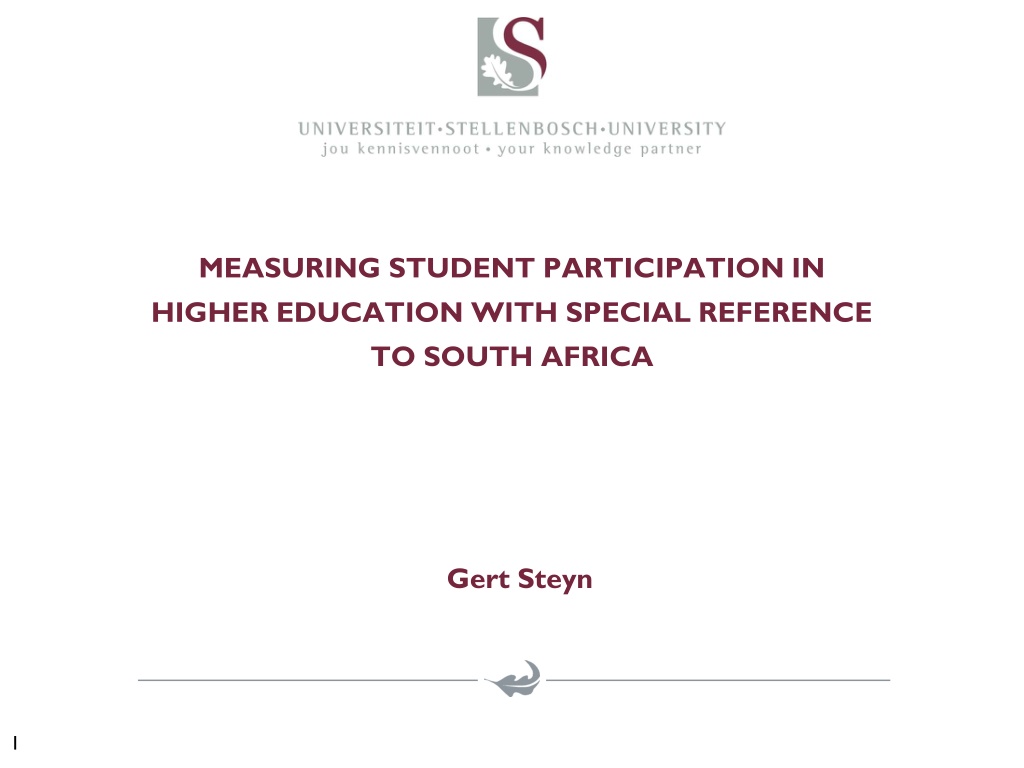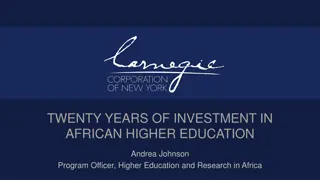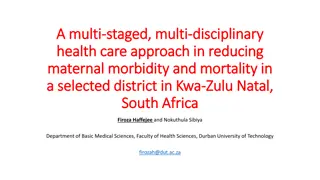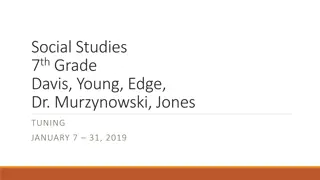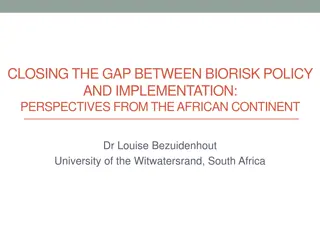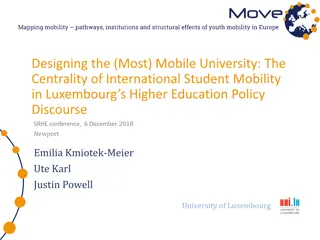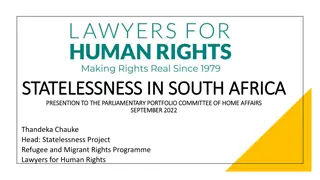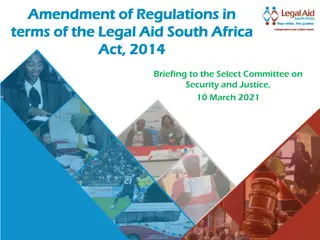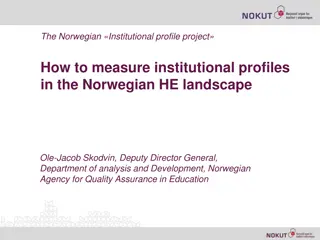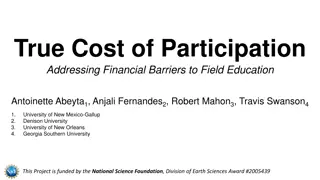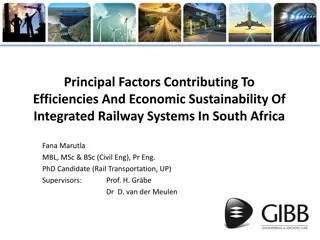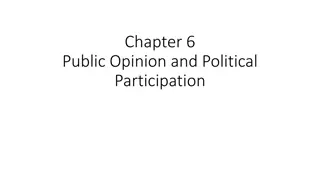Measuring Student Participation in Higher Education in South Africa
This paper discusses the measurement of student participation in higher education in South Africa, focusing on enrollment rates, demographic distributions, and age groups from 2001 to 2007. It highlights the government's role in steering quality planning and funding in the public higher education system, as well as the national plan to increase participation rates and align student profiles with demographic realities.
Download Presentation

Please find below an Image/Link to download the presentation.
The content on the website is provided AS IS for your information and personal use only. It may not be sold, licensed, or shared on other websites without obtaining consent from the author. Download presentation by click this link. If you encounter any issues during the download, it is possible that the publisher has removed the file from their server.
E N D
Presentation Transcript
MEASURING STUDENT PARTICIPATION IN HIGHER EDUCATION WITH SPECIAL REFERENCE TO SOUTH AFRICA Gert Steyn 1
Planning is always difficult especially when it has to do with the future GOVERNMENT STEERING OF THE PUBLIC HE SYSTEM QUALITY PLANNING FUNDING Approval of institutional missions, operational and equity plans, academic programme profiles New funding framework Institutional quality audits Accreditation of academic programmes Institutional inputs & outputs for funding HEMIS data analyses Student enrolment plans Government funds allocated to HE institutions 2
MINISTRY OF EDUCATION: NATIONAL PLAN FOR HIGHER EDUCATION (2001) To ensure an adequate supply of high-level human resources for social and economic development, an increased participation rate of 20% of the age group 20-24 in public higher education should be the target over the next 10-15 years. To ensure that the student and staff profiles progressively reflect the demographic realities of South African society 3
Contents of paper Participation/Enrolment rates: Definitions of Various participation rate indicators Calculations of indicators for SA according to race and gender for 2001 and 2007 Benchmarking with other countries Age distributions and participation rates: Measuring shifts in age distributions of different student groups in SA from 2001 to 2007 by means of the Kolmogorov- Smirnov statistic Conclusions 4
Source report Steyn A G W. 2009. Measuring student participation in the higher education sector in South Africa. Technical report. http://sun025.sun.ac.za/portal/page/portal/AdministrativeDivisions/INB/Home /Documentation/Documentation Internal Publications gsteyn@sun.ac.za Important data sources used in report: HEMIS summary data for 2001 and 2007 provided by DoHET Census data for 1991, 1996 and 2001. Statistics SA Mid-year estimates of individual ages. Statistics SA 5
Other important sources: participation in higher education in international comparison. A thematic report. Center for Higher Education Policy Studies. (Use six reference countries: Netherlands, Sweden, Finland, Canada, UK and USA) Kaiser F & O Heron H. 2005. Myths and methods on access and Annual reports of OECD: Education at a Glance (OECD indicators) Annual reports of UNESCO Institute for Statistics: Global Education Digest 6
Two most well-known Participation rates Gross Enrolment Rate (GER) GER = Total number of enrolments in higher education x 100% Population size in (logical) 5-year age interval Net Enrolment Rate (NER) NER = Total number of enrolments in HE in (logical) 5-year age interval x 100% Population size in (logical) 5-year age interval 7
GER and NER for SA (NPHE age interval 20-24 years) TABLE 1: CALCULATION OF GROSS AND NET ENROLMENT RATES IN HIGHER EDUCATION USING THE THE AGE INTERVAL 20 - 24 YEARS ACCORDING TO RACE, GENDER AND YEAR Headcount enrolments in HE in age group 20-24 % increase in GER 2001 to 2007 % increase in NER 2001 to 2007 % increase in GER 1996 to 2007 Headcount enrolments in HE 137617 29579 29104 227960 424260 243819 180441 308104 32742 37118 198904 576868 301725 275143 408262 35686 44152 177267 665367 307302 358065 478146 49211 52748 180985 761090 338555 422535 Population size in age group 20-24 1812487 306505 82972 378773 2580737 1238065 1342672 3153083 344373 103123 349102 3982353 1917918 2064435 3602907 392323 104265 336238 4435733 2128470 2307263 3890291 378912 116243 318831 4704277 2306426 2397851 Gross enrolment rate (GER) (%) 7.59 9.65 35.08 60.18 16.44 19.69 13.44 9.77 9.51 35.99 56.98 14.49 15.73 13.33 11.33 9.10 42.35 52.72 15.00 14.44 15.52 12.29 12.99 45.38 56.77 16.18 14.68 17.62 Net enrolment rate (NER) (%) Race/ Gender African Coloured Indian White Total Male Female African Coloured Indian White Total Male Female African Coloured Indian White Total Male Female African Coloured Indian White Total Male Female Year 19911) 1996 2001 109204 9851 15308 66060 200423 97400 103023 169615 17159 19201 79177 285152 133091 152061 3.03 2.51 14.68 19.65 4.52 4.58 4.47 4.36 4.53 16.52 24.83 6.06 5.77 6.34 8.47 42.78 7.16 7.67 7.86 1.67 13.55 43.85 80.35 12.51 26.40 34.15 26.10 42.02 25.78 36.60 26.07 -0.37 11.69 -6.69 32.22 2007 1) Excluding so-alled TBVC countries 8
GER and NER for SA (UNESCO age interval 18-22 years) TABLE 2: CALCULATION OF GROSS AND NET ENROLMENT RATES IN HIGHER EDUCATION USING THE THE AGE INTERVAL 18 - 22 YEARS ACCORDING TO RACE, GENDER AND YEAR Headcount enrolments in HE in age group 18-22 124995 14164 21229 89483 249871 114258 135612 194312 23120 26115 99991 343538 152605 190933 % increase in GER 2001 to 2007 % increase in NER 2001 to 2007 Headcount enrolments in HE 408262 35686 44152 177267 665367 307302 358065 478146 49211 52748 180985 761090 338555 422535 Population size in age group 18-22 3682002 385337 107071 346768 4521178 2172316 2348861 4050438 386969 113443 327129 4877979 2418372 2459606 Gross enrolment rate (GER) (%) 11.09 9.26 41.24 51.12 14.72 14.15 15.24 11.80 12.72 46.50 55.33 15.60 14.00 17.18 Net enrolment rate (NER) (%) 3.39 3.68 19.83 25.80 5.53 5.26 5.77 4.80 5.97 23.02 30.57 7.04 6.31 7.76 Race/ Gender African Coloured Indian White Total Male Female African Coloured Indian White Total Male Female Year 2001 6.46 37.32 12.76 8.23 6.02 -1.04 12.69 41.32 62.54 16.11 18.45 27.43 19.97 34.45 2007 Data sources: 2001 enrolments: Department of Education (2001). Education Statistics in South Africa at a Glance in 2001; 2001 population numbers according to age :Statistics SA 2007 enrolments: Department of Education (2007). HEMIS data base; 2007 population numbers according to age : Statistics SA 9
GER Benchmarking according to UNESCO (2008) TABLE 3: GROSS ENROLMENT RATE (%) (GER) OF SOUTH AFRICA AND THE DIFFERENT REGIONS OF THE WORLD ACCORDING TO GENDER FOR 1999 AND 20061) Region Male 2006 24 22 53 24 25 29 60 12 6 14 Female 2006 25 22 66 26 24 34 80 9 4 17 Total 2006 25 22 60 25 25 31 70 11 5 15 No.of countries included in 2006 146 17 18 8 18 27 22 7 29 Total 1999 18 19 38 18 14 21 61 na 4 14 WORLD Arab States Central & Eastern Europe Central Asia East Asia & the Pacific Latin America & the Caribbean North America & Western Eur. South & West Asia Sub-Saharan Africa South Africa 1) For countries where GER for 2006 was not available the newest rates were used. Source: UNESCO Institute for Statistics (2008): Global Education Digest 2008 10
Measuring increase in access to HE: The net entry rate based on synthetic cohorts of new entrants The difference between a longitudinal cohort study and a synthetic cohort study of new entrants: Longitudinal cohort study accurate but take n years Synthetic cohort study is an approximation but takes only I year Net entry rate = j {(New entrants aged j)/(pop. size aged j)}x100%, where the summation covers the ages 17 to 70 years. Other age intervals are sometimes used, e. g. 17-30 yrs in the UK. 11
The calculation of the Net entry rate is cumbersome CALCULATION OF NET ENTRY RATES (%) FOR SOUTH AFRICA IN 2001 AND 2007 ACCORDING TO GENDER 2001 2007 2001 2007 Female entrants 9182 19970 8958 5254 3617 2691 2067 1602 1380 1126 1117 975 829 786 731 662 577 548 538 490 399 388 323 314 308 294 201 238 210 171 123 96 78 69 72 43 34 28 22 13 17 12 3 5 2 4 Female population 483909 479567 475346 470377 464147 459424 457276 456039 454016 452790 444303 424774 398450 373079 346775 325548 313066 306415 298743 291094 284453 278517 273036 268246 264323 258708 250220 239954 230141 220279 211251 203703 197129 190393 183749 177046 170103 163075 156255 149534 143180 137339 131844 126401 121096 115630 109832 103852 98023 92293 86666 81180 75830 70586 14039007 Male entrants 5515 15759 8404 5736 3850 2819 2197 1732 1459 1314 1067 1000 838 835 702 737 594 577 495 462 455 362 300 299 218 219 194 161 151 141 94 75 40 50 46 28 38 14 16 19 9 6 7 1 4 2 1 3 2 Male Total entrants 14701 35735 17364 10991 7469 5513 4268 3342 2846 2444 2191 1984 1679 1630 1442 1409 1180 1134 1040 961 860 759 630 616 534 519 396 401 365 316 218 172 121 119 118 71 72 42 38 32 26 18 10 6 6 6 1 3 3 Total Female entrants 10542 23722 11189 6133 3850 2974 2369 2032 1759 1588 1430 1340 1282 1223 1123 1043 999 962 745 734 672 646 537 435 389 359 338 315 274 268 228 201 178 121 97 99 64 46 29 28 21 12 8 5 5 4 3 3 1 2 Female population 508792 503872 498261 492271 485819 479384 473228 467149 460382 452723 445653 439715 434052 427803 421793 411801 395850 376163 357085 337915 320370 305797 293532 281082 268370 259042 254482 252968 251527 250914 248203 241687 232725 224435 216254 208113 200310 192730 184948 177030 169437 162351 155625 148926 142313 135793 129332 122941 116677 110538 104431 98318 92240 86287 15509436.57 Male entrants 6205 18281 11144 6680 4506 3216 2378 1804 1439 1287 1162 1074 1024 935 946 847 717 722 572 563 457 466 357 292 282 208 182 209 144 135 130 110 84 56 50 34 36 33 16 14 10 12 5 7 4 3 Male Total entrants 16747 42003 22333 12813 8356 6190 4747 3836 3198 2875 2592 2414 2306 2158 2069 1890 1716 1684 1317 1297 1129 1112 894 727 671 567 520 524 418 403 358 311 262 177 147 133 100 79 45 42 31 24 13 12 9 7 3 3 2 2 2 Total Female entry rate 1.8975 4.1642 1.8845 1.1170 0.7793 0.5857 0.4520 0.3513 0.3040 0.2487 0.2514 0.2295 0.2081 0.2107 0.2108 0.2033 0.1843 0.1788 0.1801 0.1683 0.1403 0.1393 0.1183 0.1171 0.1165 0.1136 0.0803 0.0992 0.0912 0.0776 0.0582 0.0471 0.0396 0.0362 0.0392 0.0243 0.0200 0.0172 0.0141 0.0087 0.0119 0.0087 0.0023 0.0040 0.0017 0.0035 0.0000 0.0000 0.0010 0.0000 0.0023 0.0000 0.0000 0.0000 15.2428 Male entry rate 1.2257 3.5560 1.9114 1.3185 0.8963 0.6635 0.5215 0.4146 0.3524 0.3196 0.2653 0.2605 0.2330 0.2483 0.2247 0.2520 0.2127 0.2131 0.1893 0.1831 0.1858 0.1512 0.1275 0.1290 0.0952 0.0975 0.0890 0.0768 0.0749 0.0728 0.0505 0.0419 0.0233 0.0303 0.0291 0.0185 0.0263 0.0101 0.0121 0.0151 0.0075 0.0053 0.0065 0.0010 0.0042 0.0022 0.0012 0.0038 0.0028 0.0000 0.0016 0.0018 0.0000 0.0021 14.8585 Total entry rate 1.5742 3.8728 1.8976 1.2139 0.8357 0.6234 0.4858 0.3825 0.3279 0.2829 0.2588 0.2454 0.2215 0.2298 0.2187 0.2280 0.1992 0.1965 0.1856 0.1768 0.1625 0.1465 0.1239 0.1232 0.1083 0.1074 0.0846 0.0892 0.0845 0.0763 0.0549 0.0450 0.0328 0.0335 0.0345 0.0216 0.0229 0.0139 0.0132 0.0116 0.0099 0.0072 0.0042 0.0026 0.0028 0.0029 0.0005 0.0016 0.0018 0.0000 0.0020 0.0007 0.0000 0.0009 15.0845 Female entry rate 2.0720 4.7079 2.2456 1.2459 0.7925 0.6204 0.5006 0.4350 0.3821 0.3508 0.3209 0.3047 0.2954 0.2859 0.2662 0.2533 0.2524 0.2557 0.2086 0.2172 0.2098 0.2113 0.1829 0.1548 0.1449 0.1386 0.1328 0.1245 0.1089 0.1068 0.0919 0.0832 0.0765 0.0539 0.0449 0.0476 0.0320 0.0239 0.0157 0.0158 0.0124 0.0074 0.0051 0.0034 0.0035 0.0029 0.0023 0.0024 0.0009 0.0018 0.0000 0.0000 0.0000 0.0000 18.0557 Male entry rate 1.1958 3.5910 2.2446 1.3807 0.9580 0.7012 0.5283 0.4067 0.3301 0.3012 0.2770 0.2601 0.2519 0.2339 0.2403 0.2214 0.1972 0.2125 0.1804 0.1915 0.1669 0.1802 0.1446 0.1242 0.1264 0.0970 0.0866 0.1001 0.0693 0.0650 0.0632 0.0550 0.0437 0.0303 0.0281 0.0199 0.0219 0.0209 0.0106 0.0097 0.0073 0.0092 0.0040 0.0059 0.0035 0.0028 0.0000 0.0000 0.0011 0.0000 0.0026 0.0000 0.0000 0.0017 15.4057 Total entry rate 1.6296 4.1466 2.2451 1.3127 0.8739 0.6599 0.5141 0.4212 0.3568 0.3267 0.2996 0.2831 0.2743 0.2608 0.2537 0.2379 0.2260 0.2352 0.1954 0.2052 0.1900 0.1970 0.1654 0.1409 0.1365 0.1198 0.1119 0.1135 0.0910 0.0879 0.0789 0.0704 0.0617 0.0432 0.0373 0.0351 0.0274 0.0226 0.0134 0.0131 0.0101 0.0082 0.0046 0.0045 0.0035 0.0029 0.0013 0.0014 0.0010 0.0010 0.0011 0.0000 0.0000 0.0007 16.7551 Age 17 18 19 20 21 22 23 24 25 26 27 28 29 30 31 32 33 34 35 36 37 38 39 40 41 42 43 44 45 46 47 48 49 50 51 52 53 54 55 56 57 58 59 60 61 62 63 64 65 66 67 68 69 70 population 449957 443161 439689 435046 429541 424879 421264 417740 414013 411187 402191 383810 359637 336347 312442 292460 279281 270759 261548 252342 244904 239459 235333 231732 228939 224728 217946 209533 201601 193752 186087 178874 171969 164945 157875 151013 144439 138083 131787 125570 119447 113406 107440 101587 95878 90100 84164 78183 72366 66679 61235 56113 51273 46600 12360333.67 population 933867 922728 915035 905423 893688 884303 878540 873779 868030 863976 846494 808584 758087 709426 659218 618008 592347 577174 560291 543436 529358 517976 508368 499978 493262 483436 468166 449487 431742 414031 397337 382578 369098 355338 341624 328058 314542 301158 288042 275104 262627 250745 239284 227989 216974 205729 193996 182035 170389 158972 147901 137293 127103 117186 26399340.73 population 518912 509075 496490 483817 470361 458629 450087 443533 435905 427342 419547 412909 406510 399772 393686 382494 363552 339838 317025 294039 273876 258621 246969 235045 223045 214363 210115 208753 207727 207684 205691 200071 192132 184894 177794 170751 164042 157540 150819 143939 137294 131033 125021 119003 113065 106987 100643 94166 87833 81619 75522 69580 63808 58210 13821182.81 population 1027704 1012947 994751 976087 956180 938013 923315 910682 896287 880065 865200 852625 840562 827575 815479 794295 759402 716002 674110 631954 594245 564418 540501 516127 491415 473405 464597 461721 459254 458598 453894 441758 424858 409329 394048 378864 364352 350270 335767 320968 306731 293384 280646 267929 255378 242779 229975 217107 204510 192157 179953 167898 156048 144497 29330619.38 1 1 2 1 1 3 1 2 1 59050 1 1 1 Total 66570 125806 82427 68842 151269 12
Net entry rate benchmarking according to OECD (2003, 2007) TABLE 4: NET ENTRY RATES (%) (BASED ON AGES 17-70) OF SOUTH AFRICA AND THE OECD COUNTRIES IN SELECTED YEARS ACCORDING TO GENDER Country 2001 2005 Male 58 31 32 26 33 62 30 32 Female 72 37 33 35 56 83 43 33 Total 65 34 32 30 44 72 37 32 30 56 61 38 44 41 49 26 54 76 62 67 40 48 69 33 20 45 42 46 Male 74 34 29 39 45 63 Female 91 41 38 44 69 84 Total 82 37 33 41 57 73 Australia Austria Belgium Czech Rep. Denmark Finland France Germany Greece Hungary Iceland Ireland Italy Japan Korea Mexico Netherlands New Zealand Norway Poland Slovak Rep Spain Sweden Switzerland Turkey United Kingdom United States OECD average 36 39 57 53 39 49 47 54 39 54 64 63 70 52 37 64 36 30 45 56 49 36 48 78 96 51 64 34 47 30 63 93 89 83 67 51 89 38 24 58 71 61 36 43 68 74 45 56 41 51 30 59 79 76 76 59 43 76 37 27 51 64 54 50 42 33 38 48 52 26 51 62 48 63 80 43 50 33 45 25 58 89 76 40 42 55 37 23 41 36 41 39 54 84 29 18 49 49 51 South Africa1) 15 15 15 12 10 41 46 15 18 17 14 14 38 48 African Coloured Indian White 1) Entry rates indicated under 2005 is for 2007 13
Additional 3 participation rate indicators defined by Kaiser & O Heron (2005) Initial Participation Rate (IPR) IPR = Sum of the number of FTUG students in the 4 largest age groups in enrolment x 100% Sum of total population in corresponding age groups Varying Pathways Participation Rate (VPPR) VPPR = Sum of the number of UG students in the 4 largest age groups in enrolment x 100% Sum of total population in corresponding age groups Extended Participation Rate (EPR) EPR = Sum of the number of UG students in the 7 largest age groups in enrolment x 100% Sum of total population in corresponding age groups All three indicators are calculated for 2001 and 2007 (race, gender) by Steyn (2009) and compared to corresponding indicator values of Kaiser & O Herons s reference countries. 14
Analysis of age distributions of SA higher education students Why are age distributions of students enrolled in higher education important? 1. A change over time in participation rate indicators based on a specific age interval could be partly the result of changes in age distributions 2001 2007 % of HE students (contact) aged 20-24 years 41.69 45.99 % of population in age interval 20-24 years 9.87 9.74 2. Monitoring the progress in achieving equity in race and gender access to HE, also regarding their ages while participating in HE. Heterogeneity in age distributions of the different student groups (gender, race, contact/distance, under/postgraduate) over time are very significant and should be taken into account in higher education policy development 15
Different representations of enrolments of students in higher education in 2007 according to race and age A) Frequency polygon 50000 45000 Headcount of students 40000 35000 30000 25000 20000 15000 10000 5000 0 15 18 21 24 27 30 33 36 39 42 45 Age 48 51 54 57 60 63 66 69 72 75 African Coloured Indian White 16
Different representations of enrolments of students in higher education in 2007 according to race and age (cont) B) Standardised frequency polygon 140 Standardised Headcount of 120 100 students 80 60 40 20 0 15 18 21 24 27 30 33 36 39 42 45 Age 48 51 54 57 60 63 66 69 72 75 African Coloured Indian White 17
Different representations of enrolments of students in higher education in 2007 according to race and age (cont) C) Cumulative standardised frequency polygon 1200 Cumulative Standardised 1000 Headcount of students 800 600 400 200 0 15 18 21 24 27 30 33 36 39 42 45 Age 48 51 54 57 60 63 66 69 72 75 African Coloured Indian White 18
Different representations of enrolments of students in higher education in 2007 according to race and age (cont) 19
Comparing age distributions of 4 race groups in 2007 TABLE 9: COMPARING THE ENROLMENT AGE DISTRIBUTIONS OF THE FOUR RACE GROUPS IN 2007 BY MEANS OF THE D STATISTIC OF KOLMOGOROV- SMIRNOV1) Africans Coloureds Africans Coloureds 0.069 Indians 0.123 0.081 Whites 0.130 0.085 1) Calculated as the respective maximum absolute differences (for all ages between 15 and 75) of the four populations distribution functions. The values of D could therefore be interpreted as the (absolute) difference in the probabilities for a randomly selected enrolled student from the two race groups to have an age lower than, or equal to, the age where the (absolute) difference in probabilities is the highest. Indians 0.019 20
Changes in age distributions of 5 student groups between 2001 and 2007 according to race and gender TABLE 10: MEDIAN AGES AND KOLMOGOROV-SMIRNOV STATISTIC IN 2001 AND 2007 ACCORDING TO STUDENT GROUP, RACE AND GENDER Student Group All students Contact-tuition stud. Distance-tuition stud. Undergraduates UG New entrants Median 25.28 23.20 22.61 22.01 21.28 21.24 21.59 21.31 23.54 22.41 23.03 22.37 23.06 22.45 KS-Stat Median 21.16 20.92 20.33 20.47 19.57 19.77 20.14 20.28 20.65 20.63 20.31 20.39 21.02 20.90 KS-Stat Median 32.32 31.11 28.00 28.51 24.96 24.63 26.88 25.96 30.41 29.27 30.96 29.53 29.78 28.90 KS-Stat Median 23.74 22.10 21.23 21.06 20.25 20.28 20.27 20.35 22.09 21.41 21.95 21.33 22.24 21.49 KS-Stat Median 19.54 19.38 17.93 18.22 17.60 17.53 17.83 17.88 18.68 18.74 18.41 18.59 18.96 18.88 KS-Stat Africans 2001 2007 2001 2007 2001 2007 2001 2007 2001 2007 2001 2007 2001 2007 0.0802 0.0322 0.1064 0.0878 0.0202 Coloureds 0.0364 0.0470 0.0594 0.0352 0.0611 Indians 0.0199 0.0368 0.0479 0.0257 0.0674 Whites 0.0579 0.0308 0.0511 0.0256 0.0288 TOTAL 0.0408 0.0237 0.0828 0.0577 0.0190 Female 0.0518 0.0287 0.0857 0.0512 0.0409 Male 0.0652 0.0311 0.0831 0.0656 0.0144 21
The biggest change in the age distributions of 2001and 2007 FIGURE 3: STANDARDISED ENROLMENT OF DISTANCE-TUITION STUDENTS ACCORDING TO AGE AND YEAR Standardised headcount of students 60 50 40 30 20 10 0 15 18 21 24 27 30 33 36 39 42 45 Age 48 51 54 57 60 63 66 69 72 75 2001-stand 2007-stand 22
Some of the conclusions 1. Attaining a GER of 20% in South Africa over the next 5 to 6 years (NPHE target) is highly unlikely. There are a variety of measures available that could be used to monitor the participation in HE in South Africa annually. The well-known GER is not the best. The average increase in participation rate according to race/gender from 2001 to 2007 were: RSA - 22% Male 14% Female 27% Africans 31% Coloureds 55% Indians 8% Whites 14% 4. The GER for SA is much lower than the world average. As far as the different regions of the world is concerned it is higher than the average for Sub-Saharan Africa and South and West Asia. 5. The most significant changes in the age distributions of sub-groups of students over the period 2001 to 2007 occurred in the distance-tuition group. The median age of this group decreased from 30.41 to 29.27. 2. 3. 23
Thank you for not snoring Thank you 24
